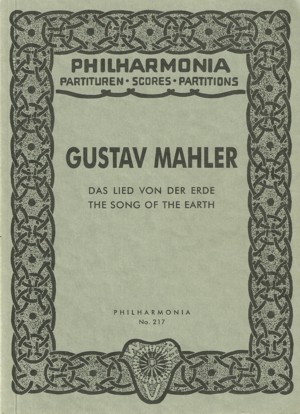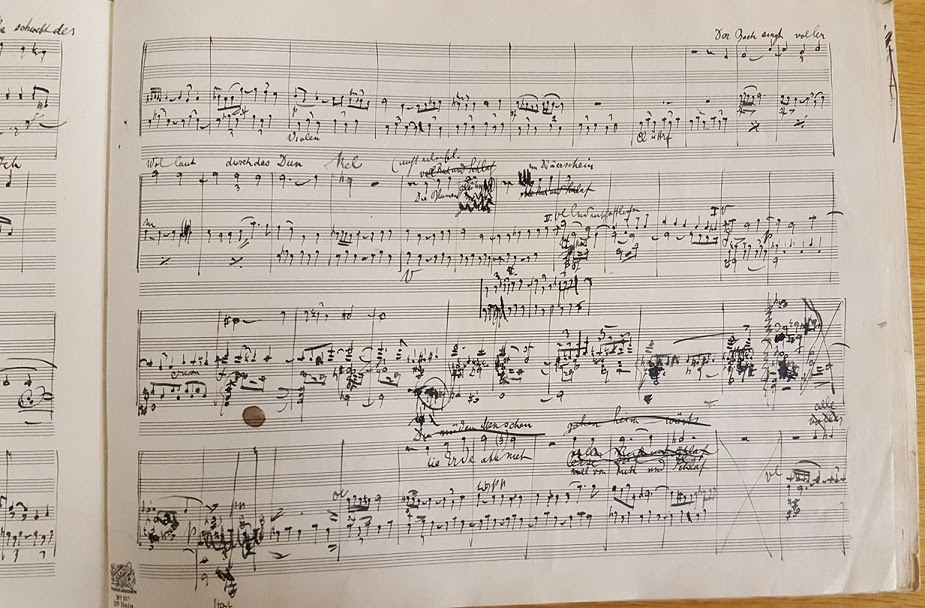Composed
- 1908: Year 1908.
- 1908: Sketches in 7 to 8 weeks in Toblach, 1908-1910 Hotel Trenkerhof, 1908-1910 Hotel Trenkerhof (Composing cottage). Altschluderbach.
- 1908: 00-06-1908 until 07-1908: Priliminary drafts.
- 1908: 00-07-1908: Composition Lied 2: Der Einsame im Herbst.
- 1908: 00-08-1908: Toblach: Visit by Paul Hammerschlag (1860-1933): He heard Mahler expressing interest in China and Chinese music. Hammerslag bought Mahler some phonograph cylinders of Chinese music recorded in China.
- 1908: 01-08-1908: Composition Lied 3: Von der Jugend.
- 1908: 14-08-1908: Draft orchestral score.
- 1908: 00-08-1908: Composition Lied 1: Das Trinklied vom Jammer der Erde.
- 1908: 20-08-1908: Back in Toblach.
- 1908: 21-08-1908: Composition Lied 4: Von der Schonheit.
- 1908: 01-09-1908: Last sketch finished.
- 1908: 01-09-1908: Toblach: Letter to Bruno Walter (1876-1962) about Das Lied von der Erde.
- 1908: 00-09-1908: Composition Lied 5: Der Trunkene im Fruhling.
- 1908: 01-09-1908: Composition Lied 6: Der Abschied.
- 1908: 17-09-1908 until 21-09-1907: Gustav Mahler finished Das Lied von der Erde in House Fritz Redlich (house of his friends Emmy and Fritz Redlich (1868-1921) in Hodonin).
- 1908: 19-09-1908: 1908 Concert Prague 19-09-1908 – Symphony No. 7 (Premiere)
- 1908: 20-09-1908: Toblach: Completion.
Performances by Gustav Mahler
- None.
Premiere
- 1911: 1911 Concert Munich 20-11-1911 – Das Lied von der Erde (Premiere, posthumous). Premiere by Bruno Walter (1876-1962) six months after Mahler’s death on 20-11-1911 in Munich.
- 1913: 00-01-1913 One of the earliest performances in London (possibly the first) occurred in January 1913 at the Queen’s Hall under conductor Henry Wood, where it was sung by Gervase Elwes and Doris Woodall. Wood reportedly thought that the work was ‘excessively modern but very beautiful’.
- 1913: 24-04-1913 Amsterdam: Das Lied von der Erde conducted by Willem Mengelberg (1871-1951). Dutch premiere Movements 2, 4 and 6. Sarah Charles Cahier (1870-1951). Amsterdam Royal Concertgebouw Orchestra (RCO).
- 1913: 02-10-1913 Amsterdam: Das Lied von der Erde conducted by Willem Mengelberg (1871-1951). Dutch premiere. Sarah Charles Cahier (1870-1951). Otto Wolf. Amsterdam Royal Concertgebouw Orchestra (RCO).
- 1914: 09-05-1914 American premiere of Symphony No. 3 at the Cincinnati May Festival conducted by Ernst Kunwald.
Willem Mengelberg
- 1917: 30-12-1917: Performance in Vienna conducted by Willem Mengelberg (1871-1951) with the Vienna Philharmonic Orchestra (VPO) of Das Lied von der Erde (Durigo and Jac. Urlus). Alma Mahler gave Willem Mengelberg (1871-1951) a manuscript-partiture and a manuscript-particel from Lied 6: Der Abschied (last movement of Das Lied von der Erde). The manuscripts were packed in a beautiful cassette given by Alma Mahler (1879-1964) in gratitude to the conductor. On the inside of the cover she wrote a flattering mission: “Dem Freunde Gustav Mahler / dem herrlichsten Interpreten seiner Werke / Willem Mengelberg / Der Abschied (Lied von der Erde)/ Partitur und Clavierauszug / am 30 dec. 1917 von Alma Mahler gegeben” which indicates how closely Mengelberg came to Mahlers musical intentions. From all of Mahler’s work, Mengelberg had with Das Lied von der Erde the most intense band and he reached a definite highlight with his interpretations.
- 1917: Arnold Josef Rose (1863-1946), concert master of the Vienna Philharmonic Orchestra (VPO) who played Das Lied von der Erde before, told Jac. Urlus (tenor) about the 30-12-1917 performance by Willem Mengelberg (1871-1951): “Jetzt haben wir zum ersten Male ‘das Lied von der Erde gehort'”.
- 1917: Jac. Urlus remembered the concert as the highlight of his career. Jascha Horenstein (1898-1973) attended the rehearsals of Das Lied von der Erde and Symphony No. 4 and told that he then understood the essence of Gustav Mahlers’ music. Positive reviews in Der Morgen and Reichspost.
- 2017: 22-03-2017 The Hague. On the occasion of her sixtieth birthday in 2016, the Gustav Mahler Foundation Netherlands (GMSN) published a cassette with two manuscripts from Gustav Mahler in facsimile, from the archives of the conductor Willem Mengelberg. It concerns the ‘Clavierauszug’ and score from ‘Der Abschied’ (Das Lied von der Erde) Alma Mahler gave to Willem Mengelberg. Limited numbered edition. First copy presented to the Austrian Ambasadrice in the Netherlands.
History Das Lied von der Erde, Lied 6: Der Abschied, for piano.
Versions
- The work was described as a symphony when published, and it comprises six songs for two singers who take turns singing the songs. Mahler specified the two singers should be a tenor and an alto. Or else a tenor and a baritone if an alto is not available.
- Mahler also arranged the work for piano accompaniment, and this has been recorded by Cyprien Katsaris with Thomas Moser and Brigitte Fassbaender. Katsaris has also performed this version in concert.
- Original version for high and middle voice and piano.
- For the first few decades after the work’s premiere, this option was little used. On one occasion Bruno Walter tried it out, and engaged Friedrich Weidemann (1871-1919), the baritone who had premiered Kindertotenlieder under Mahler’s own baton in 1905. However, Walter felt that tenor and baritone did not work as well as tenor and alto, and he never repeated the experiment.
- Following the pioneering recordings of the work by baritone Dietrich Fischer-Dieskau under conductors Paul Kletzki and Leonard Bernstein (1918-1990), the use of baritones in this work has increased.
- Arnold Schoenberg (1874-1951) began to arrange Das Lied von der Erde for chamber orchestra, reducing the orchestral forces to string and wind quintets, and calling for piano, celesta and harmonium to supplement the harmonic texture. Three percussionists are also employed. Schoenberg never finished this project, and the arrangement was completed by Rainer Riehn in 1980.
- Versions with female and male soloists.
- Versions with two male soloists.
- 1912: Vocal score with piano reduction by Josef von Woss (1863-1943).
- 2004: Octavian Society commissioned Glen Cortese to create two reductions of the work, one for a chamber ensemble of twenty instruments and one for a small orchestra with woodwinds and brass in pairs. Both these reductions are published in critical edition by Universal Edition (UE) music publishers in Vienna.
Publications
1911. Publication Das Lied von der Erde for piano by Universal Edition (UE) music publishers.

Publication Das Lied von der Erde by Philharmonia.

Conducting
Bernard Haitink (1929) owns a special facsimile edition of Das Lied von der Erde. This score of Willem Mengelberg (1871-1951) is packed with notes for performances in 1912 in Amsterdam. On the title page Willem Mengelberg (1871-1951) writes that Gustav Mahler himself felt Das Lied von der Erde was his most difficult work to perform. On the last page of the score, as Das Lied von der Erde stills, Willem Mengelberg (1871-1951) wrote a number of times, to remind himself: soft, softer, pianississimo.
Recordings
1. Versions with female and male soloists
- Bruno Walter (1876-1962), with Kerstin Thorborg and Charles Kullman, Vienna Musikvereinsaal 1936 (live). (Columbia Records, 78rpm, 7×12″ Mahler Society Issue)
- Carl Schuricht, with Kerstin Thorborg and Carl Martin Öhmann, Royal Concertgebouw Orchestra Amsterdam (October 1939 broadcast concert, live). (Bel Age CD, from acetates.)
- Bruno Walter (1876-1962), with Kathleen Ferrier and Julius Patzak, Wiener Philharmoniker (Decca LP LXT 2721 and 2722) 15-05-1952 and 16-05-1952. Gesellschaft der Musikfreunde. Remastered in 2003 by Mark Obert-Thorn (Naxos Historical 8.110871).
- Bruno Walter (1876-1962), with Mildred Miller and Ernst Haefliger, New York Philharmonic Orchestra (Sony CD SMK 64455). 1960
- Otto Klemperer, with Elsa Cavelti and Anton Dermota, Vienna Symphony Orchestra (Vox Legends CDX2-5521 [2-CD reissue])
- Hans Rosbaud, with Grace Hoffman and Helmut Melchert, SWR Sinfonieorchester Baden-Baden (Vox Turnabout LP, TV 34220S).
- Eduard van Beinum (1900-1959), with Nan Merriman and Ernst Haefliger, Concertgebouw Orchestra, Amsterdam (Fontana LP 894 120 ZKY).
- Eugen Jochum, with Nan Merriman and Ernst Haefliger, Concertgebouw Orchestra, Amsterdam (DGG 289 46362822)
- Fritz Reiner, with Maureen Forrester and Richard Lewis, Chicago Symphony Orchestra (RCA 60178-2-RG)
- Otto Klemperer, with Christa Ludwig and Fritz Wunderlich, New Philharmonia and Philharmonia Orchestras (HMV LP Angel Series SAN 179).
- Eugene Ormandy, with Lili Chookasian and Richard Lewis, Philadelphia Orchestra (Sony CD SBK 53518).
- Jascha Horenstein, with Alfreda Hodgson and John Mitchinson, BBC Northern Symphony Orchestra (BBC Legends BBC 4042).
- Georg Solti, with Yvonne Minton and René Kollo, Chicago Symphony Orchestra (Decca CD 414 066-2).
- Herbert von Karajan, with Christa Ludwig and René Kollo, Berliner Philharmoniker (DGG CD 419 058-2).
- Bernard Haitink (1929), with Janet Baker and James King, Royal Concertgebouw Orchestra Amsterdam (Philips LP 6500 831).
- Colin Davis, with Jessye Norman and Jon Vickers, London Symphony Orchestra (Philips 441 474-2).
- Eliahu Inbal, with Jard van Nes and Peter Schreier, Frankfurt Radio Symphony Orchestra (Denon 72605).
- Walter Susskind, with Lili Chookasian and Richard Cassilly, Cincinnati Symphony Orchestra (Vox VU 9040)
- Carlo Maria Giulini, with Brigitte Fassbaender and Francisco Araiza, Berliner Philharmoniker (DGG CD 413 459-2).
2. Versions with two male soloists
- Paul Kletzki, with Murray Dickie and Dietrich Fischer-Dieskau, Philharmonia Orchestra (HMV LP SXLP 30165).
- Leonard Bernstein (1918-1990), with James King and Dietrich Fischer-Dieskau, Wiener Philharmoniker (Decca CD 417 783-2). 04-1966, Sofiensaal, Vienna.
- Simon Rattle, with Peter Seiffert and Thomas Hampson, City of Birmingham Symphony Orchestra (EMI Classics 5 56200)
- Esa-Pekka Salonen, with Plácido Domingo and Bo Skovhus, Los Angeles Philharmonic (Sony Classical 60646).
3. Original version for high and middle voice and piano
- Brigitte Fassbaender (mezzo-soprano), Thomas Moser (tenor), Cyprien Katsaris (piano) (Warner Apex 2564681627 – reissue number)
- Hermine Haselböck (mezzo-soprano), Bernhard Berchtold (tenor), Markus Vorzellner (piano). Recorded 2008 at the occasion of the 100th anniversary in the Kulturzentrum Toblach, in cooperation with the Gustav-Mahler-Musikweks Toblach 2008 (C-AVI MUSIC 4260085531257).
4. Schoenberg and Riehn arrangement
- Osmo Vänskä, with Monica Groop and Jorma Silvasti, Sinfonia Lahti Chamber Ensemble (BIS CD-681).
- Robert HP Platz, with Ingrid Schmithüsen and Aldo Baldin, Ensemble Köln, Canterino 1031
- Mark Wigglesworth, with Jean Rigby and Robert Tear, Premiere Ensemble (RCA CD Dig-09026-68043-2).
- Kenneth Slowik, with John Elwes, Russell Braun, Smithsonian Chamber Players & Santa Fe Pro Musica (Dorian Recordings)
- Philippe Herreweghe, with Birgit Remmert, Hans Peter Blochwitz, Ensemble Musique Oblique (Harmonia Mundi HMA 1951477).



